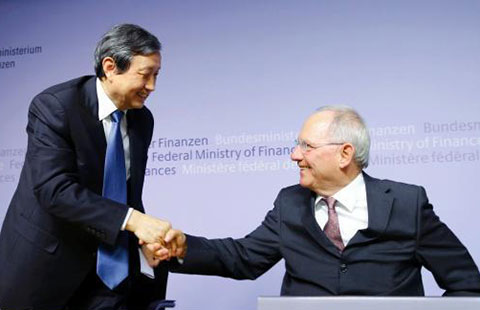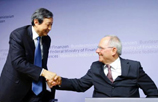China's lowering growth target 'reasonable step'
(Xinhua) Updated: 2015-03-06 09:37BRUSSELS -- China's move to lower the growth target for 2015 was a reasonable step, a European expert on Chinese studies said here Thursday.
"For the Chinese government the key issue should not be short-term growth rates but long-term reform policies to deal with underlying problems," Duncan Freeman, a research fellow at Brussels Institute of Contemporary China Studies told Xinhua in an interview on Thursday.
Freeman said that domestic factors such as the weakness of the real estate sector will make it difficult for China to maintain strong growth, and the poor performance of many major foreign markets will limit external demand.
"Although growth will be slower, it will still represent significant demand both internally and internationally," he said.
China unveiled its economic growth target for 2015 Thursday in a government work report delivered by Premier Li Keqiang to the third session of the 12th National People's Congress (NPC). The target was lowered to "around 7 percent," a level not seen since 2004 and 0.5 percentage points lower than that of 2014.
Rajiv Memani, Chairman of Global Emerging Markets Committee of Ernst & Young, is also upbeat about China's economic stability against the backdrop of a slower growth rate.
"Given China's increasing dominance in the global economy, it was understandable that any reduction in growth would be watched intensely," he told Xinhua in a recent interview when commenting on China's possible move of lowering growth rate.
He said China was prudently balancing itself towards a consumption-based economy, from an export-oriented economy, with a strategic focus on innovation.
"Given Beijing's goal of restructuring their economy - less reliant on manufacturing and more reliant on services - moderate economic growth is not a bad thing in the longer term. In this scenario it's important to focus on the quality - job creation and wage growth remain relatively stable - and not just the speed, of the economy," said Memani.
Memani said the growth numbers on its face may appear to be on a lower side, but in real terms this growth has been much better compared to previous years.
"In its latest forecast for 2015, International Monetary Fund reduced China's growth to 6.8 percent, its slowest in 25 years, but investors should also consider that the Chinese economy is now more than 25 times bigger than it was 25 years ago," he said.
- Israel requests to join Asian Infrastructure Investment Bank
- Chinese stocks rebound on April 1
- China, the West in Africa: more room for cooperation than competition
- Nanjing cuts taxi franchise fees
- Air China increases flights to Milan, Paris
- JD.com raises delivery charges
- Veteran corporate strategist upbeat about China economy
- L'Oreal China sales revenue up 7.7% in 2014

















